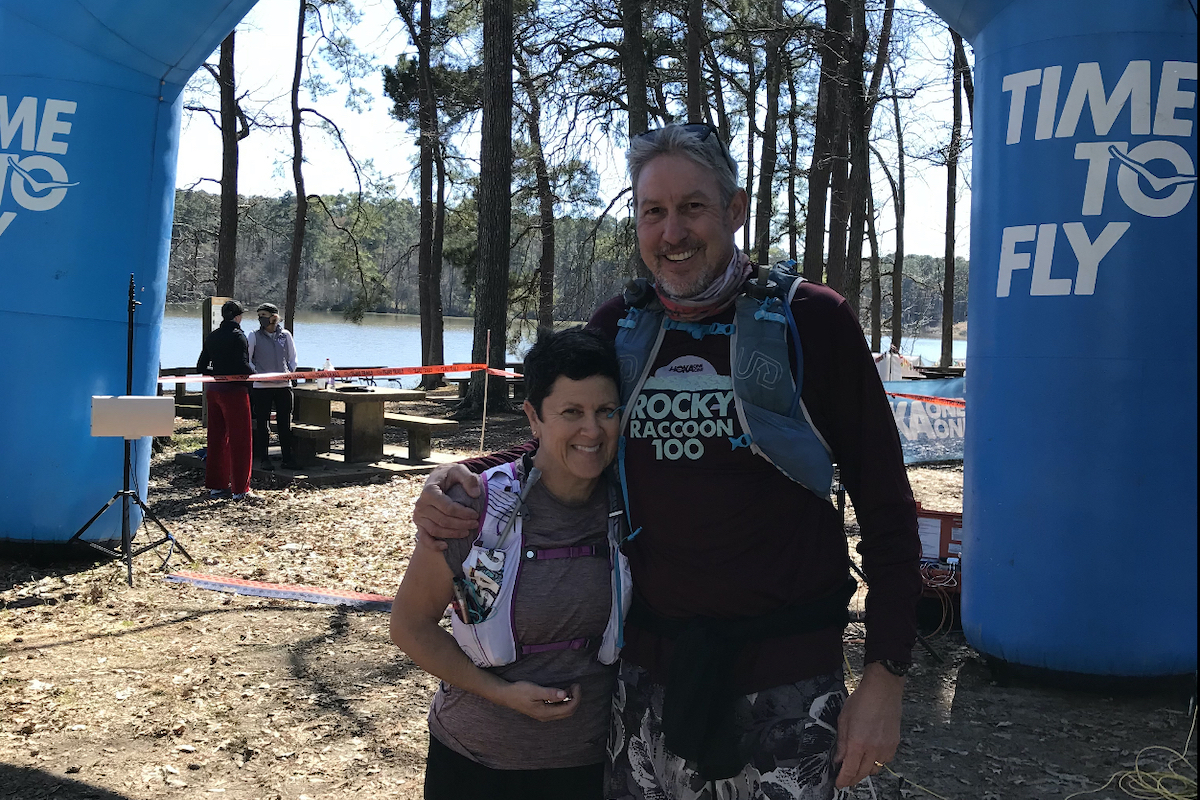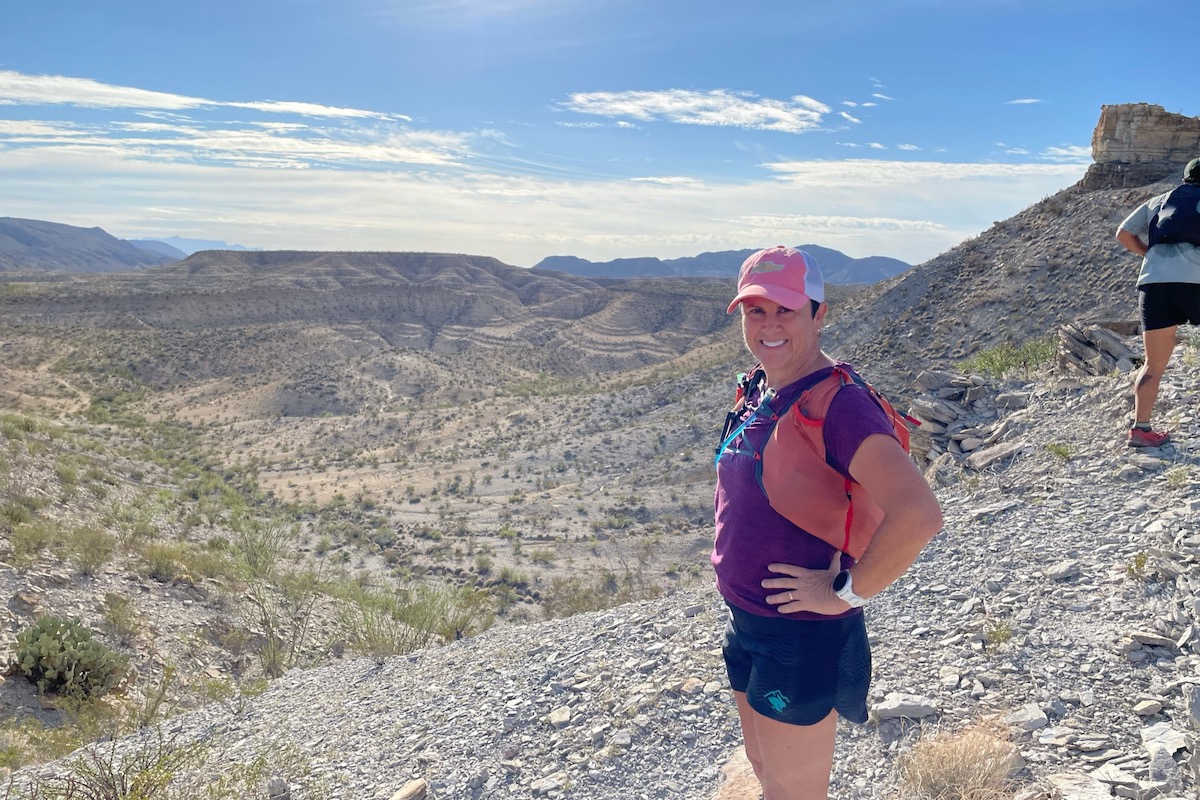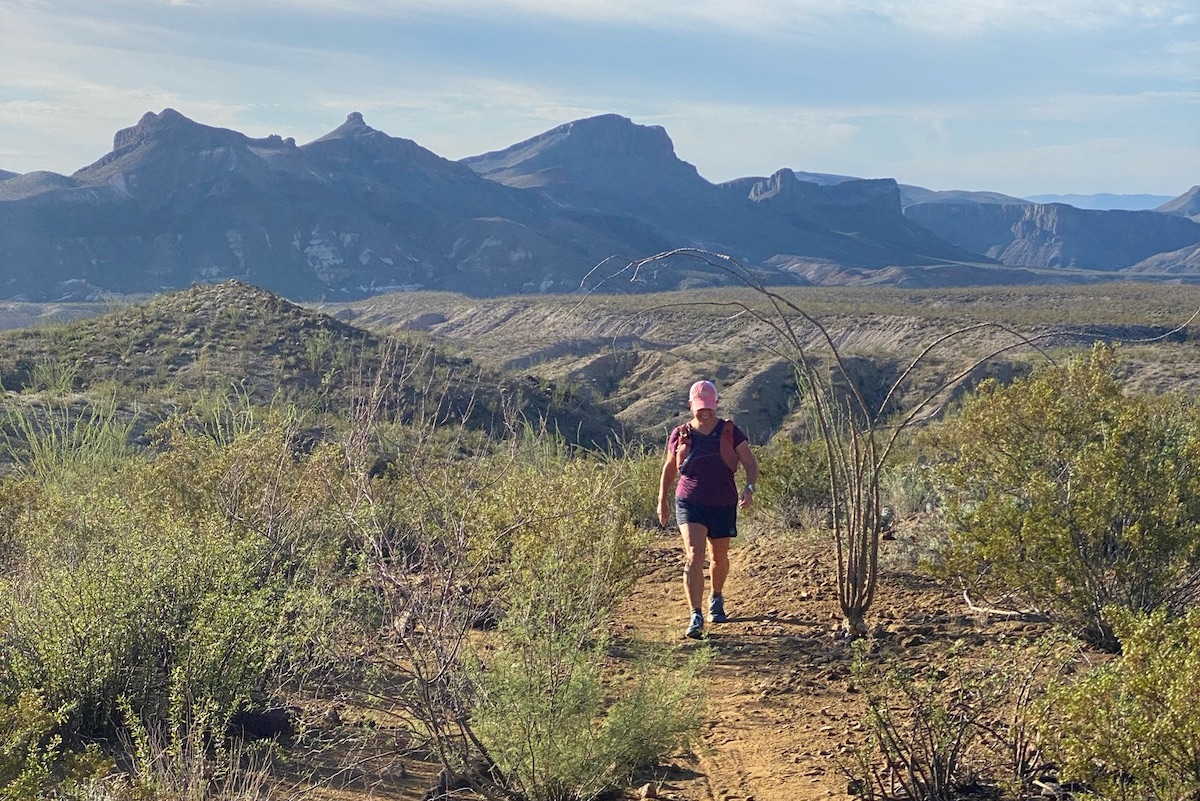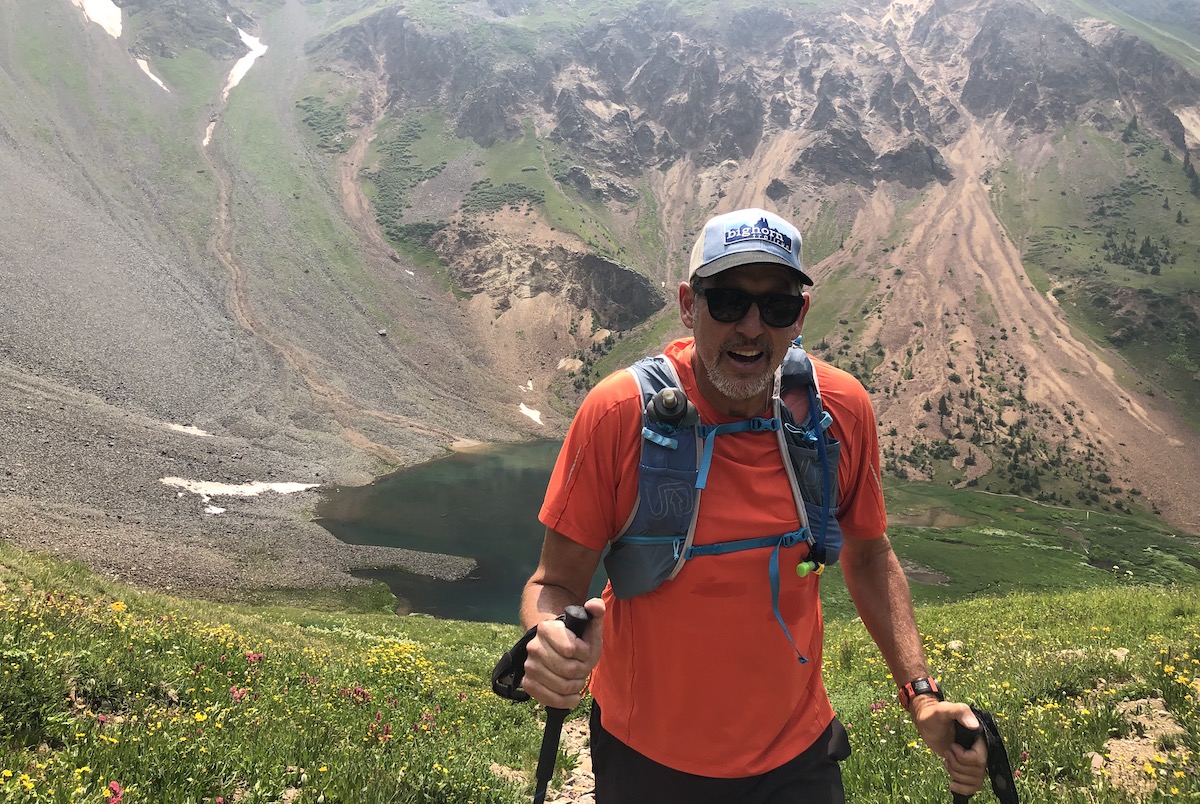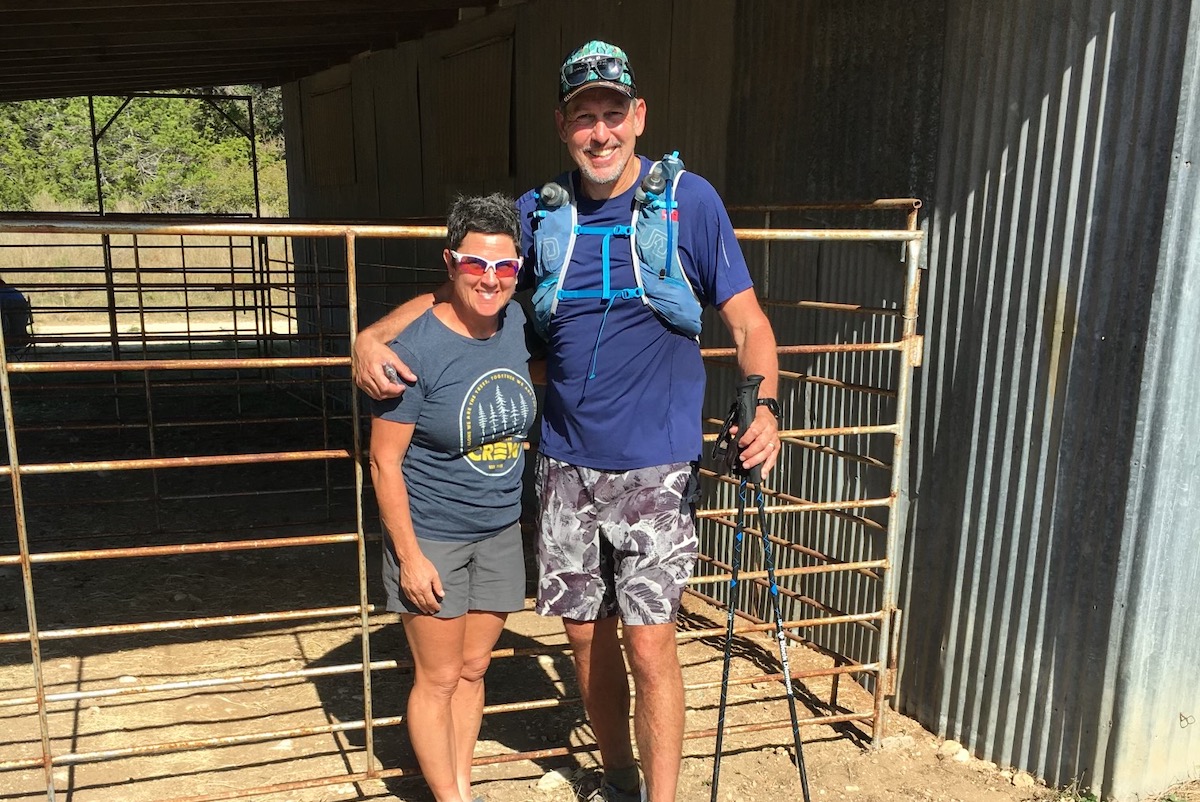When I first moved to San Antonio, Texas, about 16 years ago, the trail running community here consisted of about five people. They took me under their tiny wing, and my life changed for the better. One of the first long run conversations I remember having was with Tony Maldonado, a talented trail runner, whose family thought he was too old to be running ultramarathons. Looking back, I think Tony might have been 49 at the time — my current age.
He mentioned the you’re-too-old chorus he heard from his non-running friends and family enough during our runs together that it left a deep impression on me. Certainly, Tony was not acting like the majority of people his age in San Antonio. It seemed like these cultural norms got harder to brush aside the longer he ran.
By unexpected good fortune, I ran into Tony on the trail this past week. We haven’t been able to run together for years, but, of course, we slipped into conversation easily, just like before. We ran at the same pace we always had. Afterward, I thought again about the impact of cultural norms on older runners. I wondered if there was a way to insulate ourselves against unhelpful societal expectations regarding age.
That got me thinking about Tom Bowling and Michele Genereux. Tom was one of the original five San Antonio Rockhoppers. He and Michele have been married for 30 years. They are 59 and 57 years old, respectively. They both run and race regularly — more now than ever with their daughter now at college. Tom has run over 100 trail races since he started running in his 40s.
Michele didn’t start trail racing until she was almost 50, and she now has over 50 races to her credit. As luck would have it, I recently got to spend some time with Tom and Michele in Big Bend Ranch State Park in western Texas. I cornered them for an interview about the 2021 Cactus Rose 50 Mile, which they were getting ready to participate in. I also followed up with them after the event. We talked about their goals for the event as well as some of the cultural age norms that face age-group runners.
[Editor’s Note: These interviews have been edited for brevity and clarity.]
Interview With Michele Genereux and Tom Bowling Before the 2021 Cactus Rose 50 Mile
iRunFar: Why are you running the Cactus Rose 50 Mile?
Tom Bowling: This will be my 12th year. The first time I went out to see a 100-mile race, it was Cactus Rose. Our friends Tony Maldonado and Chris Russell were doing it. I helped pace and crew a little bit, and I thought it was a great race course. I also love the self-support idea. It was very rugged terrain, and you have to rely on yourself. I did it a series of years in a row, and then it became a longevity goal. I just wanted to see how many years I could do it and be healthy enough to do it every year. [Author’s Note: Cactus Rose traditionally provides water and ice and little else at aid stations.]
Michele Genereux: My reason is not as symbolic. I just followed Tom into the sign up. It is one of the more challenging races I’ve done. I mean, I’ve done a handful of 50 milers, and this might be my fifth time at Cactus Rose. It’s nice to have my own internal benchmark. It’s always a humbling day out there.
iRunFar: What are your goals this year?
Genereux: My first goal is always to finish, and to finish with comfort. I don’t want to be in distress or hurting so much that I wouldn’t want to return. Those are always my one-two goals. My third goal, always hanging off in the distance is, wouldn’t it be grand to be faster than the last time I did it?
iRunFar: Has that goal order changed over time?
Genereux: No, that was always kind of the deal for me. I’m a dig-deep, get-it-done girl. Maybe what I have, or at least strive to have, over the more athletically gifted or talented triathletes or ultramarathon runners is just the ability to dig deep and survive the hardest parts. The time is less of an issue for me. Placing is less of an issue. That’s sort of a golden surprise at the end if it happens, but it’s not the motivator.
Bowling: I’m approaching Cactus Rose differently this year. I’m going to treat it more like an experiment and do something different with run-walk timing. I want to see if I can get closer to even splits between the first and second 25-mile loops. I think I’ve gotten as close as 16 minutes — maybe even closer than that. For most people, there’s at least an hour difference in their splits. I like the idea of having a different kind of goal.
iRunFar: Do you two ever run together when you race?
Genereux: Define running together.
Bowling: We’ve done it a couple of times.
Genereux: He’s in front of me, or in the distance. We’ll stick together in the same region. Running together is not always the best idea. We’ve learned that too. I’m a loner as a runner. I like to be by myself. I like to be in my own space and there is a negative energy for me when I’m around …
iRunFar: Tom? [laughs]
Genereux: I start to worry about other people. I start to obsess about what’s going on with them, or if they’re waiting on me. So it’s not as productive for us. Knowing that he’s out there is enough for me. I can feel that spirit just as much.
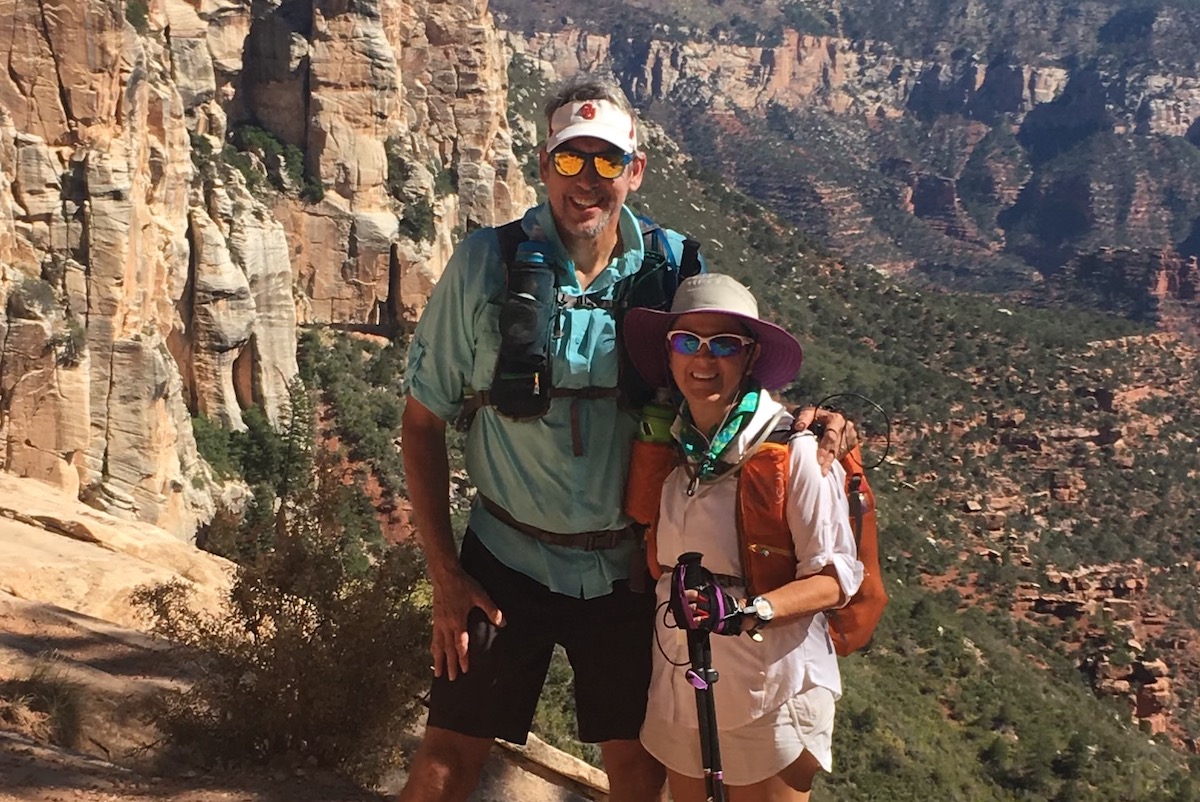
Michele and Tom running Rim-to-Rim-to-Rim in the Grand Canyon in 2018. Photo courtesy of Tom Bowling.
iRunFar: How has your relationship to racing changed since you started trail running?
Bowling: My attitude and expectations are definitely different. I still love to race. I love to have the excitement of having a race coming up. Lacing it up. Being out there. Seeing friends or meeting and talking to new people in a race. In certain races, I still feel a desire to just go hard and see what happens too.
Genereux: That process is still as important to me as the end result is. The race is still the goal. It’s the motivation for me to keep training.
iRunFar: What will be the biggest challenges for you at Cactus Rose this year?
Genereux: I mean, the challenge is always making sure I’m doing all the things I need to be doing to keep going for 50 miles, like nutrition, taking care of my feet, and all those box-checking kinds of things. I don’t anticipate any big surprises because I have experience out there. I think that helps a little bit. New races offer me a lot more anxiety. And it’s a generous cutoff. I need to have generous cutoffs. I can’t be stressed about that.
iRunFar: Races organized by Tejas Trails do have generous cutoffs. Do you think races should have generous cutoffs if there are no safety issues to prevent them from having folks out longer on the course? If you can maintain an 18- to 20-minute per mile hiking pace, should you be able to finish an ultra?
Genereux: I have really strong opinions about this. For me, I need a generous cutoff for two reasons: psychological and physical. Psychologically, a tight cutoff is an unnecessary stressor for me to deal with during my race day. I’m a slow starter. I’m slow to warm up, so I don’t want to be worrying about being at aid stations at particular times early on. If the race director is willing to take that into consideration, then I’m more apt to sign up for that race. We just did the Sky Island Race, and it had pretty aggressive cutoffs. I made them, but it just adds to that angst during the race. I’m less likely to sign up for a race with aggressive cutoffs.
Bowling: I think race directors can do whatever they want to do. There are plenty of races out there. I think people just need to be really thoughtful about the races they sign up for. Do they want to stress themselves? I ran the Jemez Mountain 50 Mile and Bighorn Trail 52 Mile this summer, and I was racing the cutoffs. I made them, but it was like I was finishing a race each time. It was such a good feeling to make the cutoffs. The race director has to consider volunteers. Also, if there were five more hours at Jemez, I might have laid down to sleep in the canyon a little bit. Race directors just need to do whatever they feel like they need to do.
iRunFar: Race directors just need to be aware of how their decisions affect race demographics? The more aggressive the cutoffs, the fewer 50-year-old racers you might get signing up for your race?
Bowling: Yeah.
iRunFar: Do you think about your age when you’re running?
Bowling: Well, when I’m running with 20-year-olds, I do. [laughs] And when the 20-year-olds start trying to guess what year everybody was born, and everybody is born in the 1980s, and then they guess I was born in the ’70s, and I have to tell them 1962, then I do. Somebody will say, “Oh, that’s when my dad was born.” That game is not fun.
iRunFar: Does your age weigh on you or do you use it as an excuse to back off during a race?
Bowling: Age hasn’t really been a concern for me until this year when I’m turning 60. It’s the weirdest thing. All of a sudden it became: That is kind of old. I’m trying to work through that. I’m still really doing what I want to do, so I’m trying to not let it become a barrier. Basically, whatever you think, that’s what’s going to happen, so I just don’t want to let that take over.
Genereux: In contrast, I’ve had many moments where I’m out there, by myself, digging in, and I give myself some props: “You know you’ve got this girl! You’re 57 years old. Ain’t many of your 57-year-old buds out here doing this. Keep going!” So I think you can turn it into a way-to-go-girl moment.
iRunFar: When things go badly in an ultra, does being older give a runner a bit of a leg up? Is it easier to keep things in perspective and problem-solve the older you are, or are those things more a function of experience?
Bowling: I think experience helps out a ton. I continue to make mistakes in ultras, but I think, in the beginning, there’s a much bigger chance that you’re going to do something that’s going to cause you to blow up, like going out too fast.
iRunFar: If both a 20-year-old and a 60-year-old blow up, is it easier for the 60-year-old to keep things in perspective, adjust goals, and finish?
Bowling: I think it goes back to experience, not age. If you’ve done enough ultras and you blow up, well, you’ll know to just walk until you feel good enough to run again.
Genereux: Don’t you think ego could affect that? When you’re younger, there’s definitely some proving of things going on out there. I see that a lot in ultrarunners that are younger, and I’ve observed it a lot in the triathlon world. There’s a lot of enthusiasm. There’s a lot of excitement. You’ve got a new community, and you’re strong because you’re 30 years old. And you go out with this energy that’s just unbridled, and as a result, amongst our little running group, we’ve seen these blowups and runners with their tails between their legs at the finish. They finish, but they’re totally unhappy with the experience. As opposed to reflecting on what a grand thing they just did, the journey was amazing, you got it done, they’re unhappy. That satisfaction at the finish takes a while.
iRunFar: Being gratified by the process or journey that takes place during a race and ends at the finish line takes a while to learn?
Genereux: Yes.
iRunFar: Do non-runner peers question your decision to run ultras in your 50s?
Genereux: A psychiatrist I work with asked me why I run ultras not too long ago. I told him it was because I still can. I need the distance because I think that’s where I fall into a better rhythm and headspace, and it’s a zen moment for me to be in that rhythm. The longer it is, the better it is.
Bowling: Everybody has to find their sweet spot. I like the 50-mile distance because I can be back in a bed the night after the race. You accomplish a lot during the day, and you put your body out there, but then you can also recover. I feel very fortunate to have a partner who enjoys the adventures as much as I do. I love to lace it up for races and she gets that!
Genereux: Fifty miles is a lifestyle distance.
iRunFar: What advice do you have for married running couples?
Genereux: There’s always one person in the couple that will lean toward being more selfish than the other. Then feelings get hurt. So I think you’ve constantly got to be revealing and expressing what you need and why you need it, so that the other person can understand what’s important to you because that’s the only way to negotiate the change.
Bowling: I promised myself I wasn’t going to cry in this interview. [lots of laughs] I have very little to add since I was obviously the selfish one. [more laughs]
Interview With Michele Genereux and Tom Bowling After the 2021 Cactus Rose 50 Mile
In a strange twist, the 2021 Cactus Rose 50 Mile was moved at the very last minute from its usual location in Hill Country State Natural Area, in Bandera, Texas, to Camp Eagle outside Rocksprings, Texas. Both Tom and Michele had raced there before, but the combination of more rugged terrain and high humidity affected both their days.
Bowling: I ditched my run-walk plan because I thought there would be too much up and down for it to be effective. In hindsight, I wish I had done it because I kind of blew up after the first 25-mile loop. I eventually hiked in slowly for my slowest Cactus Rose 50 Mile by two hours. If I learned anything, it’s that you never have it all figured out, and if think you do, it’s not for long if you are competing in ultras. [Author’s Note: Tom ran 15:30:26.]
Genereux: What was once a good nutrition plan didn’t help me at this race. As a result, I had to adjust in order to be able to finish. That included liquids only. I learned that you never seem to stop learning.
Final Thoughts
It seems undeniable that Michele and Tom’s running relationship provides a buffer for them against cultural age norms. Their goals and assessments of their abilities seem unaffected by ideas of what most 50- and 60-year-olds around them are doing.
2021 Cactus Rose 50 Mile Age Group Results
- Men’s 45-to-49 age group – Nate Smith, 14:47:28
- Men’s 50-to-54 age group (and overall men’s race winner) – Don Hauk, 10:10:38
- Men’s 55-to-59 age group – Mark Huteson, 14:03:36
- Women’s 55-to-59 age group — Michele Genereux, 16:12:20
- Men’s 65-to-69 age group – Kent Fish, 16:21:10
- Women’s 65-to-69 age group – Judy Meisner, 24:19:28
- Men’s 70-to-74 age group – Fred Thompson, 18:21:17
Call for Comments
- Do you feel pressure from non-running family and friends to limit your running goals as you get older?
- Do you second-guess your choices because they’re not what most people your age are doing?
- If you don’t have a running partner, what buffers have helped you withstand the chorus of “You’re too old to be doing that”?
